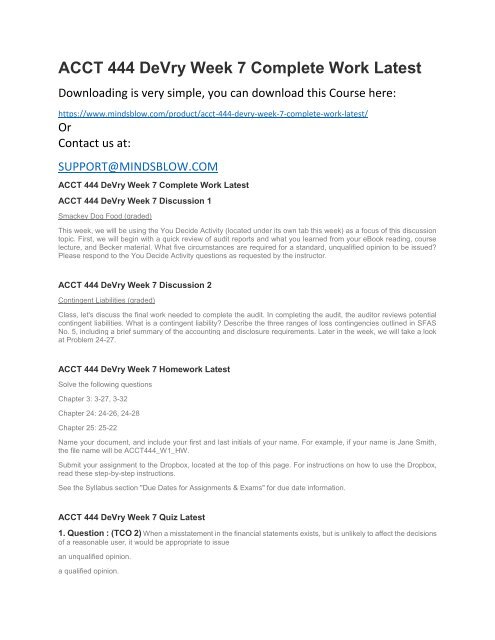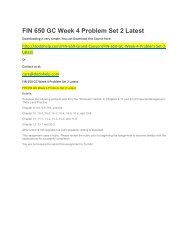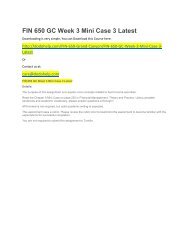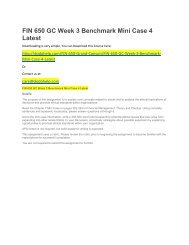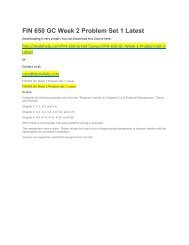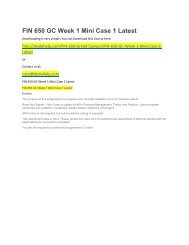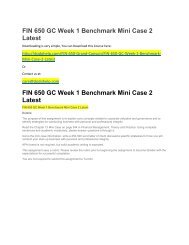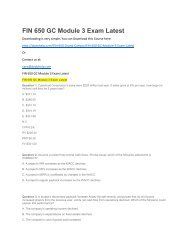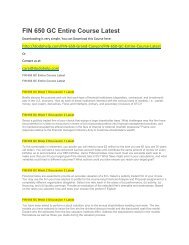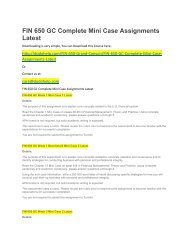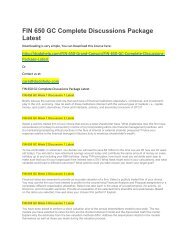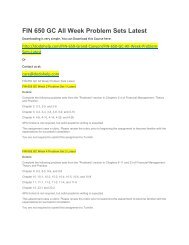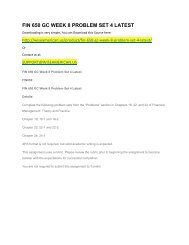ACCT 444 DeVry Week 7 Complete Work Latest
Create successful ePaper yourself
Turn your PDF publications into a flip-book with our unique Google optimized e-Paper software.
<strong>ACCT</strong> <strong>444</strong> <strong>DeVry</strong> <strong>Week</strong> 7 <strong>Complete</strong> <strong>Work</strong> <strong>Latest</strong><br />
Downloading is very simple, you can download this Course here:<br />
https://www.mindsblow.com/product/acct-<strong>444</strong>-devry-week-7-complete-work-latest/<br />
Or<br />
Contact us at:<br />
SUPPORT@MINDSBLOW.COM<br />
<strong>ACCT</strong> <strong>444</strong> <strong>DeVry</strong> <strong>Week</strong> 7 <strong>Complete</strong> <strong>Work</strong> <strong>Latest</strong><br />
<strong>ACCT</strong> <strong>444</strong> <strong>DeVry</strong> <strong>Week</strong> 7 Discussion 1<br />
Smackey Dog Food (graded)<br />
This week, we will be using the You Decide Activity (located under its own tab this week) as a focus of this discussion<br />
topic. First, we will begin with a quick review of audit reports and what you learned from your eBook reading, course<br />
lecture, and Becker material. What five circumstances are required for a standard, unqualified opinion to be issued?<br />
Please respond to the You Decide Activity questions as requested by the instructor.<br />
<strong>ACCT</strong> <strong>444</strong> <strong>DeVry</strong> <strong>Week</strong> 7 Discussion 2<br />
Contingent Liabilities (graded)<br />
Class, let's discuss the final work needed to complete the audit. In completing the audit, the auditor reviews potential<br />
contingent liabilities. What is a contingent liability? Describe the three ranges of loss contingencies outlined in SFAS<br />
No. 5, including a brief summary of the accounting and disclosure requirements. Later in the week, we will take a look<br />
at Problem 24-27.<br />
<strong>ACCT</strong> <strong>444</strong> <strong>DeVry</strong> <strong>Week</strong> 7 Homework <strong>Latest</strong><br />
Solve the following questions<br />
Chapter 3: 3-27, 3-32<br />
Chapter 24: 24-26, 24-28<br />
Chapter 25: 25-22<br />
Name your document, and include your first and last initials of your name. For example, if your name is Jane Smith,<br />
the file name will be <strong>ACCT</strong><strong>444</strong>_W1_HW.<br />
Submit your assignment to the Dropbox, located at the top of this page. For instructions on how to use the Dropbox,<br />
read these step-by-step instructions.<br />
See the Syllabus section "Due Dates for Assignments & Exams" for due date information.<br />
<strong>ACCT</strong> <strong>444</strong> <strong>DeVry</strong> <strong>Week</strong> 7 Quiz <strong>Latest</strong><br />
1. Question : (TCO 2) When a misstatement in the financial statements exists, but is unlikely to affect the decisions<br />
of a reasonable user, it would be appropriate to issue<br />
an unqualified opinion.<br />
a qualified opinion.
an adverse opinion.<br />
a disclaimer of opinion.<br />
Question 2. Question : (TCO 2) When a client has not applied GAAP consistently from the prior year to the<br />
current year, the auditor does not concur with the appropriateness of the change, and the change in GAAP has a<br />
material effect on the financial statements, the auditor should issue a(n)<br />
disclaimer.<br />
adverse opinion.<br />
unqualified opinion.<br />
qualified opinion.<br />
Question 3. Question : (TCO 2) When qualifying an opinion because of an insufficiency of audit evidence, an<br />
auditor should refer to the situation in the:<br />
Auditor’s Responsibility Paragraph<br />
Notes to the Financial Statements<br />
Yes<br />
Yes<br />
Auditor’s Responsibility Paragraph<br />
Notes to the Financial Statements<br />
Yes<br />
No<br />
Auditor’s Responsibility Paragraph<br />
Notes to the Financial Statements<br />
No<br />
Yes<br />
Auditor’s Responsibility Paragraph<br />
Notes to the Financial Statements<br />
No<br />
No<br />
Question 4. Question : (TCO 2) Jules, CPA, is reporting on comparative financial statements, but Shah, CPA<br />
conducted the previous year's audit. Which of the following is not true in this situation?<br />
Dual dating may be used to indicate the appropriate dates for each audit.<br />
If Shah's report is not presented, an other-matter paragraph should be included to describe this situation.<br />
If Shah's report was qualified due to a scope limitation, Jules may still issue an unmodified opinion on the current year's<br />
financial statements.<br />
If Shah's report will be presented, management will need to provide a representation letter to Shah.<br />
Question 5. Question : (TCO 11) Which of the following is not a purpose of the client letter of representation?<br />
To impress upon the audit firm its responsibility for the audit<br />
To impress upon management its responsibility for the financial statement assertions<br />
To remind management of potential misstatements or omissions in the financial statements
To document the responses from management to inquiries about various aspects of the audit<br />
Question 6. Question : (TCO 2) Under U.S. auditing standards, when an auditor believes there is substantial<br />
doubt about the ability of an entity to continue as a going concern, all of the following should be included in the audit<br />
documentation, except:<br />
The conditions that gave rise to the substantial doubt.<br />
The auditor's conclusion about whether substantial doubt remains or is alleviated.<br />
Management's conclusion regarding whether substantial doubt remains or is alleviated.<br />
The effect of the auditor's conclusion on the auditor's report.<br />
Question 7. Question : (TCO 2) Which of the following statements is a basic element of the auditor's report under<br />
U.S. auditing standards?<br />
The disclosures provide reasonable assurance that the financial statements are free of material misstatement.<br />
The auditor evaluated the overall internal control.<br />
An audit includes evaluating significant estimates made by management.<br />
The financial statements are consistent with those of the prior period.<br />
Question 8. Question : (TCO 11) The audit step most likely to reveal the existence of contingent liabilities is<br />
a review of vouchers paid during the month following the year-end.<br />
accounts payable confirmations.<br />
mortgage-note confirmation.<br />
an inquiry directed to legal counsel.<br />
Question 9. Question : (TCO 2) In which type of report would you read the following statement: "We believe that<br />
our examination provides a reasonable basis for our opinion."?<br />
Review<br />
Audit<br />
Examination<br />
Agreed-upon procedures<br />
Question 10. Question : (TCO 2) Which of the following reporting options is least likely with regard to<br />
supplementary information that is required by GAAP?<br />
The auditor's report on the financial statements includes an other-matter paragraph stating that the auditor has applied<br />
the required procedures.<br />
A disclaimer of opinion is issued on supplementary information.<br />
The auditor's report on the financial statements includes both an opinion on the supplementary information and a<br />
statement restricting the use of the report.<br />
The auditor's report on the financial statements includes an opinion regarding whether the supplementary information<br />
is fairly stated in all material respects in relation to the financial statements taken as a whole.


